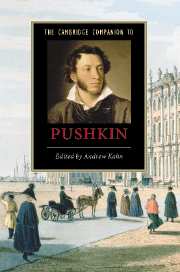Book contents
- Frontmatter
- Introduction
- Part I Texts and Contexts
- 1 Pushkin’s life
- 2 Pushkin’s lyric identities
- 3 Evgenii Onegin
- 4 Pushkin’s drama
- 5 Pushkin’s long poems and the epic impulse
- 6 Prose fiction
- 7 Pushkin and politics
- 8 Pushkin and history
- 9 Pushkin and the art of the letter
- 10 Pushkin and literary criticism
- Part II The Pushkinian tradition
- Appendix on verse-forms
- Guide to further reading
- Index
3 - Evgenii Onegin
from Part I - Texts and Contexts
Published online by Cambridge University Press: 28 March 2007
- Frontmatter
- Introduction
- Part I Texts and Contexts
- 1 Pushkin’s life
- 2 Pushkin’s lyric identities
- 3 Evgenii Onegin
- 4 Pushkin’s drama
- 5 Pushkin’s long poems and the epic impulse
- 6 Prose fiction
- 7 Pushkin and politics
- 8 Pushkin and history
- 9 Pushkin and the art of the letter
- 10 Pushkin and literary criticism
- Part II The Pushkinian tradition
- Appendix on verse-forms
- Guide to further reading
- Index
Summary
Pushkin’s masterpiece Evgenii Onegin (1823-30) is universally recognised as the starting-point of the classic nineteenth-century Russian novel, and has challenged generations of readers and critics. The period of writing Evgenii Onegin spanned an amazing epoch in the poet’s creativity, and, as the leading nineteenth-century Russian critic Vissarion Belinsky aptly remarked, 'to evaluate this work is to evaluate the poet himself in the full range of his literary endeavours'. The first impression Evgenii Onegin gives is of striking simplicity and disarming transparency - with its minimalist plot, formal elegance and economy and crystalline purity of language. Closer analysis reveals ever-new depths of philosophical, psychological and literary meaning, characteristic not only of great poetry but stemming from the work’s radically innovative narrative structure. In its self-conscious play with narrative form and fictionality, Evgenii Onegin joins the novelistic tradition of Cervantes, Diderot and Sterne, while expanding the potential of mock-epic and burlesque poetry.
Outdoing Byron
A useful starting-point for approaching Pushkin’s innovation is its acknowledged debt to, and differences from, Byron’s 'novels in verse'. Like Childe Harold’s Pilgrimage and Don Juan, Evgenii Onegin was written in numbered verse stanzas for which Pushkin devised a variant of the sonnet, in fourteen iambic tetrameter lines, that has become known as the 'Onegin stanza' (on which see the Appendix). It was published in chapters that appeared irregularly over many years, with no ostensible end point envisaged, and featured a loose framework associated with the adventures of an eponymous hero that allowed the poet to incorporate disparate material (literary, historical, cultural and quasi-autobiographical).
- Type
- Chapter
- Information
- The Cambridge Companion to Pushkin , pp. 41 - 56Publisher: Cambridge University PressPrint publication year: 2006
- 1
- Cited by



